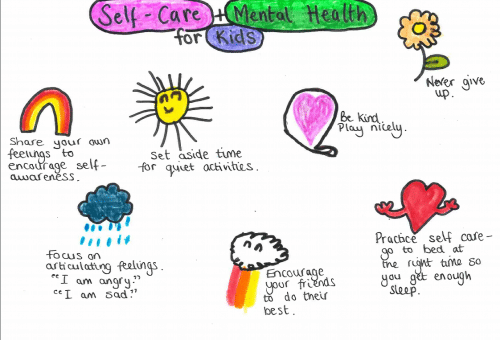What Is Mental Health?
Growing up is meant to be one of the very best times in anyone’s life but it is tough. In England 1 in 8 five to 19 year olds suffer from some form of mental health.
So what is mental health and how can we help?
Mental health includes our emotional, psychological, and social well-being. It affects how we think, feel, and act. It also helps determine how we handle stress, relate to others, and make choices.

Mental Health and Wellness
Positive mental health allows people to:
- Realize their full potential
- Cope with the stresses of life
- Work productively
- Make meaningful contributions to their communities
Coping strategies to maintain positive mental health include:
Stay aware of your body and its reaction to stress. Anxiety and stress can be your body telling your brain that something is wrong and needs to be addressed.
Reduce stress. Sometimes stress is a necessary part of our lives and can even be a healthy reaction to circumstances. Keeping in mind what parts of your life cause stress and asking how you can reduce these stresses is important.
Rest. Take time to yourself to deal with stress – your health is important, and everyone needs a break sometimes.
Take care of yourself. People start to forget about taking care of themselves when they are feeling overwhelmed. Be honest with yourself about your hygiene, nutrition, exercise, sleep habits, and how you can take care of yourself better.
Find tools that work to reduce your stress
Improving your self-esteem
Self-esteem is how you think and feel about yourself. Having healthy self esteem makes it easier to cope with life’s ups and downs. If you have low self-esteem, the thoughts and feelings you have about yourself tend to be negative.
Try these sites for some different ways to boost your self-esteem:
- Mental Health Foundation: wellbeing and positive thinking podcast
- Young Minds: top tips on how to boost self-esteem
Taking time to relax
Regular relaxation is beneficial for your mental health. If you make a regular time each day to practice some of the techniques below you will get better and better at relaxation and notice your day-to-day stress levels are lower. You will also become able to use relaxation at the times you need them most.
Sharing what’s bothering you
Sharing what’s bothering you can help to make it feel more manageable. If you feel that the problems you’re having are too big for you to deal with by yourself you may want to get in contact with your GP, someone from school/college or someone else you trust.
If you’re finding it hard to talk to people you know about how you feel, contact ChildLine, The Samaritans, or Mindfull.
These links might also be helpful:
- Not sure how to start a conversation with your GP about mental health? Check out the award-winning Doc Ready app
- Have a look at ChildLine’s short video about depression for young people
- We’ve designed a Cope-ometer to help younger children understand the link between stresses and mental health – but it applies to all of us!
- Check out the Thinkuknow guide to internet safety
Exercise
Everyone knows that exercise is good for your body – but it’s also important for your emotional wellbeing. Scientists have discovered that exercise causes your brain to release chemicals that make you feel good. There is evidence to show that exercise can help raise self-esteem, help sleep problems, improve memory and concentration, takes your mind off negative thoughts, as well as reduces feelings of anxiety and depression.
Try these sites for more ideas:
- NHS Choices: physical activity for teens:
- Young Minds: exercise and mental health:
Mental Health Helplines:
Anxiety UK
Charity providing support if you have been diagnosed with an anxiety condition.
Phone: 03444 775 774 (Monday to Friday, 9.30am to 10pm; Saturday to Sunday, 10am to 8pm)
Website: www.anxietyuk.org.uk
Mental Health Foundation
Provides information and support for anyone with mental health problems or learning disabilities.
Website: www.mentalhealth.org.uk
Mind
Promotes the views and needs of people with mental health problems.
Phone: 0300 123 3393 (Monday to Friday, 9am to 6pm)
Website: www.mind.org.uk
Samaritans
Confidential support for people experiencing feelings of distress or despair.
Phone: 116 123 (free 24-hour helpline)
Website: www.samaritans.org.uk
YoungMinds
Information on child and adolescent mental health. Services for parents and professionals.
Phone: Parents’ helpline 0808 802 5544 (Monday to Friday, 9.30am to 4pm)
Website: www.youngminds.org.uk

